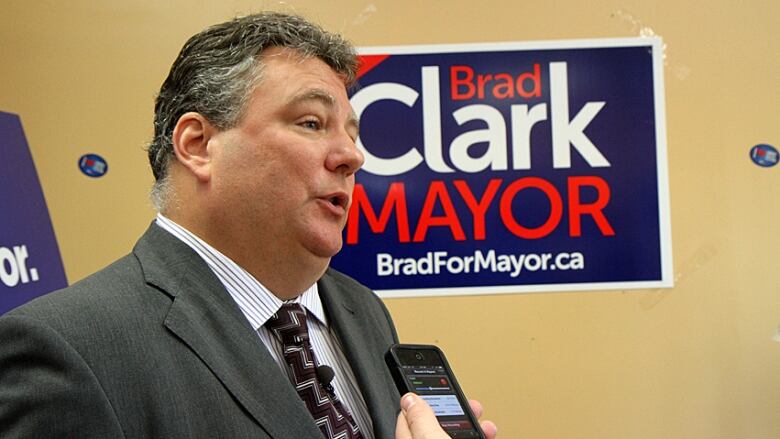Citing costs to taxpayers, Brad Clark says he's against LRT
Clark says he made up his mind after he heard it would cost taxpayers more than advertised

Mayoral hopeful Brad Clark came out against light rail transit (LRT) Wednesday, saying that even if the province agrees to pay all the capital costs, Hamilton taxpayers still cant afford it.
And he saysit's not, as his critics charge, a flip-flop from an earlier position.
Even if the province grants up to $1.3 billion to pay for rails, trains and stations, LRT will not be free, Clark said in a media event at his Dundas office. He favours bus rapid transit instead.
With Hamilton still one of the highest taxed municipalities in the province, saddling homeowners with higher property taxes to pay for theLRTis irresponsible.- Brad Clark
His two highest-profile challengers, former mayor Fred Eisenberger and Coun. Brian McHattie, are in favour of LRT. Clark voted last year in favour of the Rapid Ready report, Eisenberger says, which supports LRT with full provincial funding.
"Brad Clark voted in favour of LRT when council unanimously supported LRT withcapital funding as promised by the province," Eisenberger said. "One would ask what his position is now."
Clark says he heard new numbers this year that turned him off the project. Among those numbers: that the capital costs will likely be closer$1.3 billion, rather than the $811million often cited. He also learned, he said, that bus rapid transit on the A line, LRT on the B line, a new Mountain maintenance facility and connecting local transit with GO service would cost $73.5 million per year to operate, or another $300 per household.
"When I heard those numbers I thought 'Whoa,'" he said. "The public has not heard these figures. The public has not been informed of these numbers."
Residential taxpayers would have to pay extra to upgrade underground water and sewer lines, as well as the road bed and traffic signals, Clarksaid.
With Hamilton still one of the highest taxed municipalities in the province, saddling homeowners with higher property taxes to pay for the LRT is irresponsible.
Clark's argument, McHattie said, ignores the economic benefits LRT would bring to the city. Both a Canadian Urban Institute and Metrolinx report predicted economic spinoff along the 14-kilometre corridor, which would run from McMaster University to Eastgate Square.
LRTwill build Hamilton's tax base, McHattie says
That economic spinoff will mean new tax revenue for the city, he said.
"Its a lower-city redevelopment plan," McHattie said. "Its an economic development strategy for Hamilton."
In this years budget, the province allocated $15 billion over 10 years for transit in the Greater Toronto-Hamilton Area. The province will spend that money, McHattie said. With LRT lines planned for Brampton and Kitchener-Waterloo, he wants Hamilton to get its share.
"That money needs to come to Hamilton rather than other cities," he said. "Income tax dollars are flowing out of Hamilton and dont come back into Hamilton in the percentage that they should."
Eisenberger announced earlier this year that he'd like to see community consultation on LRT. That's still his position, he said.
Next mayor will influence the LRT decision
Ryan McGreal, a Hamilton LRT advocate, says there isn't enough information to rule out LRT. Clark's announcement is based on "assumptions," he said.
Whether the next mayor is for or against LRT could make or break the project, he said.
It's very complex and has lot of moving parts," he said. For it to happen, "you need a champion at the political level. Even though the mayor is one vote around council, you need that leader to get direct support and make that happen."
The city has an annual infrastructure deficit of $200 million, and within two years, its debt will hit a billion dollars, Clark said.
"If your roof is leaking, your basement is flooding, your driveway is crumbling and your windows are drafty, you don't get a loan for an in-ground pool."












_(720p).jpg)


 OFFICIAL HD MUSIC VIDEO.jpg)
.jpg)



























































































